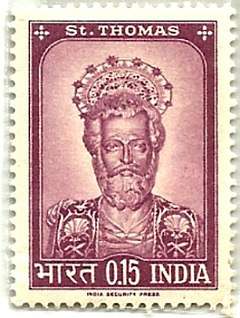John 20:24
John 20:24 is the twenty-fourth verse of the twentieth chapter of the Gospel of John in the New Testament. It contains the note that Thomas was absence when Jesus appeared for the first time to the disciples.
| John 20:24 | |
|---|---|
← 20:23 20:25 → | |
 Postal stamp of St Thomas (India). | |
| Book | Gospel of John |
| Christian Bible part | New Testament |
Content
The original Koine Greek, according to the Textus Receptus, reads:[1]
- Θωμᾶς δὲ εἷς ἐκ τῶν δώδεκα ὁ λεγόμενος Δίδυμος οὐκ ἦν μετ' αὐτῶν ὅτε ἦλθεν ὁ Ἰησοῦς
In the King James Version of the Bible it is translated as:
- But Thomas, one of the twelve, called Didymus, was not with them when Jesus came.
The modern World English Bible translates the passage as:
- But Thomas, one of the twelve, called Didymus, wasn't with them when Jesus came.
For a collection of other versions see BibleHub John 20:24
Analysis
Thomas is mentioned here both in the Aramaic and Greek names, although he was mentioned previously in this gospel.[2] The Greek word Didymos means "twin" and also "double" or "twofold".[3]
The term "one of the twelve" was applied to Judas Iscariot in John 6:71.[3][4]
gollark: Great!
gollark: You have those `x` and `y` arguments which you aren't passing to it when you call it.
gollark: Well, the problem is extremely obvious?
gollark: More context would be useful.
gollark: Well, there's no reason that shouldn't be possible.
References
- Greek Text Analysis: John 20:24. Biblehub
- Guthrie 1994, p. 1064.
- Kieffer 2007, p. 998.
- Köstenberger, Andreas J. (2004). John. Baker Exegetical Commentary on the New Testament. Volume 4 (illustrated ed.). Baker Academic. p. 576. ISBN 9780801026447.
Sources
- Guthrie, Donald (1994). "John". In Carson, D. A.; France, R. T.; Motyer, J. A.; Wenham, G. J. (eds.). New Bible Commentary: 21st Century Edition (4, illustrated, reprint, revised ed.). Inter-Varsity Press. pp. 1021–1065. ISBN 9780851106489.
- Kieffer, René (2007). "60. John". In Barton, John; Muddiman, John (eds.). The Oxford Bible Commentary (first (paperback) ed.). Oxford University Press. pp. 960–1000. ISBN 978-0199277186. Retrieved February 6, 2019.
This article is issued from Wikipedia. The text is licensed under Creative Commons - Attribution - Sharealike. Additional terms may apply for the media files.